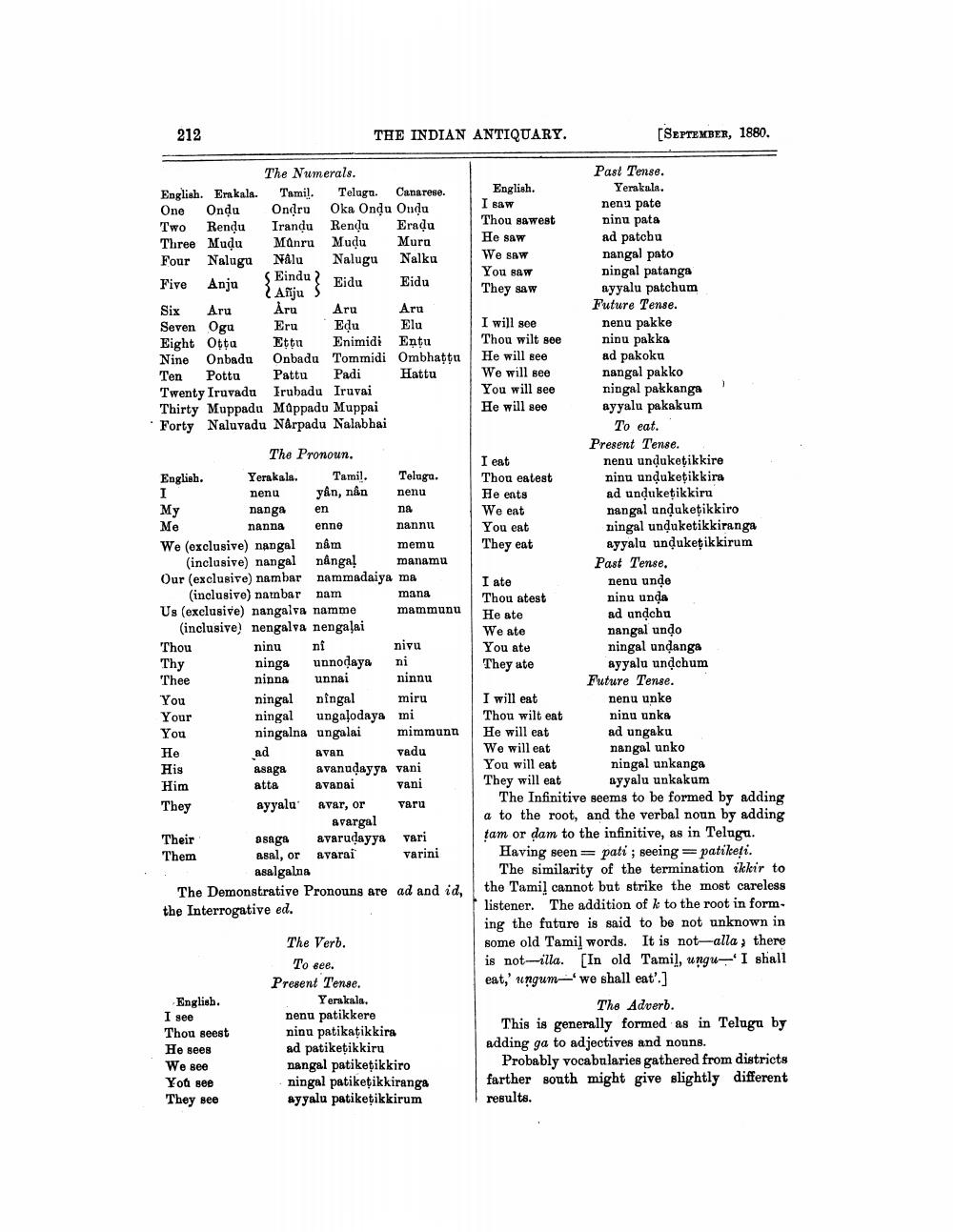________________
212
THE INDIAN ANTIQUARY.
[SEPTEMBER, 1880.
Eindu? Eidu
Elu
na
The Numerals. English. Erkala. Tamil Teluga. Canarese. One Ondu Ondru Oka Ondu Ondu Two Rendu Irandu Rendu Eradu Three Mudu Manru Mudu Mura Four Naluga Nálu Nalugu Nalku Five Anja 3
Eidu AnjuS Six Aru Aru Aru Aru Seven Ogu
Eru
Edu Eight Ottu Ettu Enimidi Entu Nine Onbadu Onbadu Tommidi Ombhattu Ten Pottu Pattu Padi Hattu Twenty Iruvadu Irubadu Iruvai Thirty Muppadu Mappadu Muppai Forty Naluvadu Nárpadu Nalabhai
The Pronoun. English. Yerakala. Tamil. Teluga.
nenu vấn, nân nenu My
nanga en Me nanna enne
nannut We (exclusive) nangal nêm
memu (inclusive) nangal nânga! manamu Our (exclusive) nambar nammadaiya ma (inclusive) nambar nam
mana Us (exclusive) nangalva namme mammunu
(inclusive) nengalva nengaļai Thou ninu ni
nivu ninga unnodaya Thee
ninna unnai ninnu You
ningal ningal miru Your ningal ungaļodaya mi You
ningalna ungalai mimmunn He ad svan
vadu His
asaga avanudayya vani Him atta avanai
vani ayyala Avar, or varu
avargal Their
asaga avarudayya vari Them
asal, or avarai varini
asalgalna The Demonstrative Pronouns are ad and id, the Interrogative ed.
Past Tense. English
Yerakala. I saw
nenu pate Thou sawest ninu pata He saw
ad patchu We saw
nangal pato You saw
ningal patanga They saw
ayyalu patchum
Future Tense. I will see
nenu pakke Thou wilt see ninu pakka He will see ad pakoka We will see nangal pakko You will see ningal pakkanga He will see ayyalu pakakum
To eat.
Present Tense. I eat
nenu unduketikkire Thou eatest ninu undukeţikkira He ents
ad unduketikkiru We eat
nangal undukeţikkiro You eat
ningal unduketikkiranga They eat
ayyalu undukeţikkirum
Past Tense. I ate
nenu unde Thou atest
ninu unda He ate
ad undchu We ate
nangal undo You ate
ningal undanga They ate
ayyalu undchum
Future Tense. I will eat
nenu unke Thou wilt eat ninu unka He will eat ad ungaku We will eat
nangal unko You will eat ningal unkanga They will eat ayyalu unkakum
The Infinitive seems to be formed by adding a to the root, and the verbal noun by adding tam or dam to the infinitive, as in Telugu.
Having seen= pati ; seeing=patiketi.
The similarity of the termination ikkir to the Tamil cannot but strike the most careless listener. The addition of k to the root in form ing the future is said to be not unknown in some old Tamil words. It is not-alla, there is not-illa. (In old Tamil, ungu-'I shall eat, ungumw e shall eat'.]
The Adverb. This is generally formed as in Telugu by adding ga to adjectives and nouns.
Probably vocabularies gathered from districts farther south might give slightly different results.
Thy
ni
They
English. I see Thou seest He sees We see You see They see
The Verb.
To see. Present Tense.
Yerakala. nenu patikkere ninu patikatikkira ad patikeţikkiru nangal patikeţikkiro ningal patikeţikkiranga ayyalu patikeţikkirum




